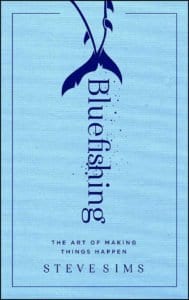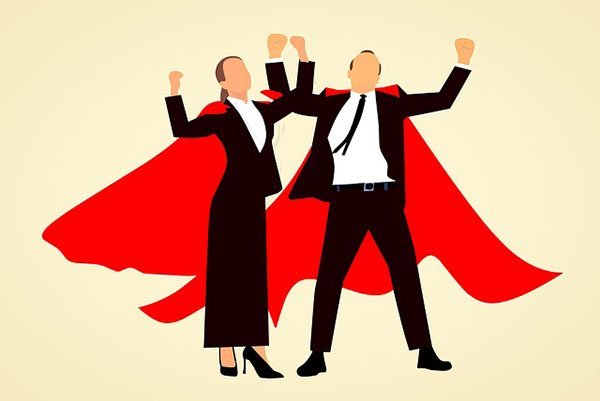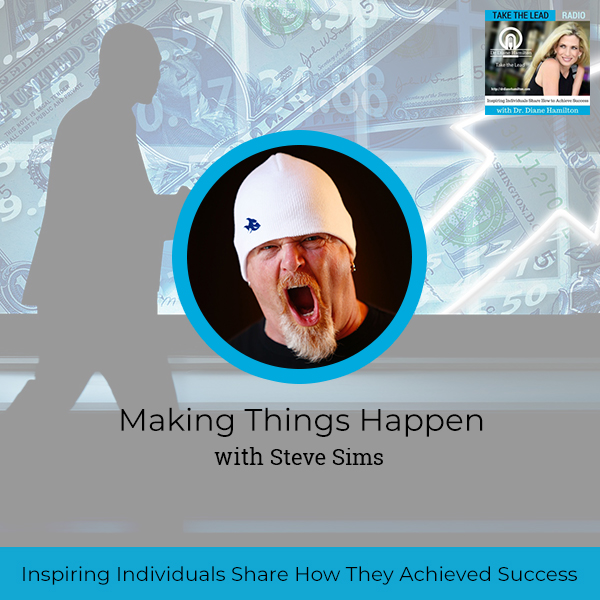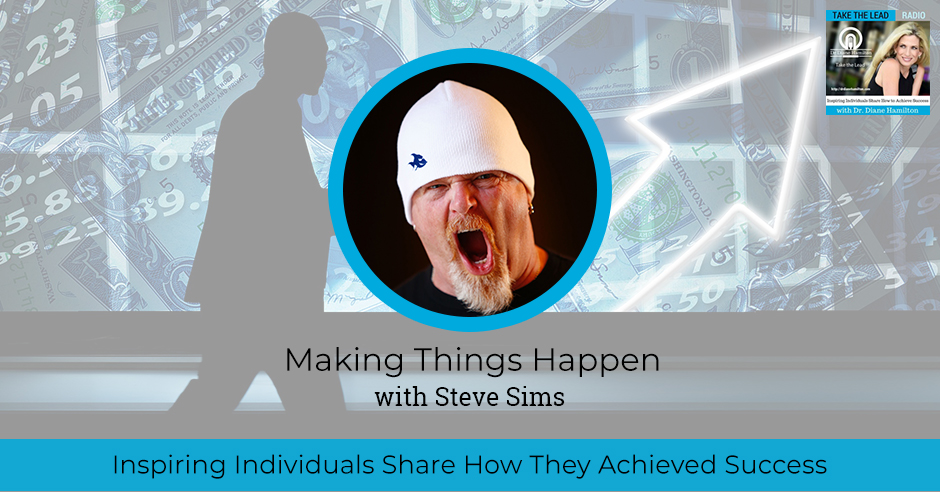People, especially those who have much money to spare, can make uncanny requests. However, even the craziest can be done by simply making things happen. Steve Sims, the CEO and Founder of Bluefish, shares his insights into the art of making things happen for other people. He narrates how he transformed himself from a club worker to an entrepreneur who makes dreams come true. He talks about his cheapest but worthiest client wherein he encountered the influential keyword – impact – which led him to realize the importance of family and friends versus money. Getting to know what people really want and how to understand their requests and make them happen are some of the interesting things he shares in his book, Bluefishing.
I’m so glad you joined us because we have Steve Sims. He’s the CEO and Founder of Bluefish and the author of Bluefishing. He is the real-life Wizard of Oz, bestselling author and a keynote speaker at Harvard and everywhere else. He can make dreams come true. This is going to be one of the most fascinating shows.
Listen to the podcast here
Making Things Happen with Steve Sims

Bluefishing: The Art of Making Things Happen
I am here with Steve Sims, who is the CEO and Founder of Bluefish. He is a real-life Wizard of Oz, bestselling author and keynote speaker at Harvard, Pentagon and Global Conferences speaker as well. He’s the guy you contact if you want to see the Titanic, sing on stage with your favorite rock band or have a dinner party with Andrea Bocelli serenading you. He is the author of Bluefishing. I’m looking forward to having him on the show. Welcome, Steve.
It’s a pleasure to be here.
You are an interesting guy. I met you through the Genius Network, Joe Polish’s group. That network is filled with a lot of interesting people, but what you do is next level interesting to me. I can’t wait to talk to you about this. I did see your Jay Abraham interview. I’ve seen a lot of stuff that you have on your site. You make wild, amazing dreams come true. I want to get your backstory of how you got to this level of creating these lifetime events and writing this book. What is your background?
My background, like most entrepreneurs, isn’t you leave school with qualifications, you enter a job and work your way up. That’s not the entrepreneurial way. It doesn’t matter what financial background you’re in, it’s all the same. I was a working-class kid from a construction family in East London. I left school at fifteen. I started working on the building site. I realized, like all entrepreneurs, that I didn’t fit. I went out trying to find my little hole to plug. I bounced off of the walls. My mom thought I couldn’t keep a job. She thought I had extreme ADD. Being in East London, she thought I was waiting for a bus to take me to jail. She thought I was that kid that was going to be eternally in trouble. Like all entrepreneurs, we are aggravated until we find something that focused us.
As the infamous Joe Polish that you mentioned, one of his beautiful statements that I love is that you need oysters to make pearls. I was trying to make my pearl. I was trying to find out where I could make my pearl. It ended up getting me into a job that I applied for as a stockbroker. I got transferred to Hong Kong for this job. I lasted 24 hours before being fired. I started working on the doors of seedy, dubious clubs because I have about 120 pounds and look like Brad Pitt. If you could go to the polar opposite of that statement, it’s what I really look like. I had the perfect build and demeanor to work on a rather dodgy nightclub. Funny enough, it was from that gritty frontline presence that got me a beautiful view of society. You saw so many different people, the way they walked up to a door. You could recognize the guys that were looking to score that night. You can recognize the women that were out on a scout, the guys that were going to have a fight that night because they couldn’t control their bit. You got to notice all these demographics well.
I’ve always said, “The best vantage point to see real life is from a service industry.” It’s the waiters, the bar staff. These people get to see what make people tick quickly. The good ones, they can react to different people in a heartbeat. I was lucky to have that vantage point. I thought it was a bad thing. It suddenly became probably my best and secret sauce in the fact that I can communicate with the affluent people going into a club to celebrate a business deal and the bunch of guys going in there trying to scout for the night and the cougars. I was able to respond quickly to different dynamics of people. That was my good starting point to get a good sense of how to communicate with different demographics.
Having worked in sales, I learned a lot about how to connect with people from that vantage point. When you’re around people and you get to see them in their best and their worst, it gives you a good idea of people’s wants, needs and desires. That’s what you’re dealing with, what you do now at Bluefish. You have everybody’s ideal job to set up these dreams. I was trying to think about what my dream would be. I’m trying to figure out if you could have me recreate Trader Vic’s on an exotic island with Chris Hemsworth, Roberto Benigni, Neil deGrasse Tyson and Oprah or something. I wouldn’t mind Andrea Bocelli and Ed Sheeran singing and serenading. My first thought is, “What does that cost me?” I don’t know if you get into that when people interview you. Are you dealing with people that, “If you have to ask, we shouldn’t be even talking to you,” people because it’s such an expensive thing? Do you deal with people at all levels?
This is probably where I’m going to talk myself out of business. I had never ever provided anything to a client at the budget that they’ve asked me. This is how the conversation goes. A client will come to me and they will go, “How are you doing? I’ve heard about you. I want to do X.” Let’s cover that bit. People, 99% of the time, dilute what that true fantasy is. People don’t want you to know what makes them tick. They don’t want to reveal what’s important to them. I’ve got people married in the Vatican. I’ve got people having dinner with The Botanist. I’ve got people having breakfast on the 25K Club with Donald Trump and his family before his presidency.
All of these things, I can turn around to you and go, “Do you want to do that?” You could go, “That does not interest me at all.” The second it does, then I’m getting closer to your core. Another classic 25K member asked me to meet the rock band Journey, and shake their hand. In talking with him and understanding the backstory of why this was so important to him, I got to get out of him the real essence of what he was trying to achieve. In getting in there and using your inner therapist, we realized that if I have given him what he asked for, it wouldn’t have provided him with what he needed. In the first aspect, what he wanted would’ve cost X. That wasn’t what we needed. We needed to find out what’s driving this. What’s the reason behind this? What’s your why? We needed to understand that.
Here’s the point. If I’m too expensive, it’s because I haven’t demonstrated the value or worth to you. When someone comes to me and say, “My budget is $50,000.” I couldn’t give a crap if you told me it was Tuesday at 2:00. That number is not relevant to me. I have to sit on the phone or in the meeting and go, “It looks great.” It’s gone. I’ve forgotten it. What I’m trying to find out is, “What are we doing? Why are we doing it? What’s going to wake you up at 2:00 in the morning in cold sweat, saying, ‘I can’t believe I did that?”’ Once I’ve got there, I’m demonstrating the value. I’m providing you access, which you couldn’t even dream of. I’m providing you with a trigger, an emotion and an experience that’s never been done before. Once I can get that into your passion point, that inner part of your core, you’ll sell your left and right kidney and your firstborn. It’s like a drug because I’ve demonstrated you the blue pill. I said to you, “I hear what you say, but I’m going to ignore that and I’m going to listen to what you deserve, what you need and what you desire. I’m going to give you that.” I’ve had people come to me with budgets of $50,000, $100,000 or $300,000. It tripled and quadrupled. I’ve gone ten times above what the original budget was.
[bctt tweet=”There’s a massive difference between impact and price tag.” username=””]What was the cheapest and the most expensive that you’ve delivered?
The cheapest was $1,700. We had a client that every anniversary, we had done something amazing. It’s private jets to Paris for a night, French food and flies back the following morning. Sip cocktails, sitting in on a mound of diamonds. We did a ton of flamboyant and over the top. The cheapest we did was about $50,000 something and the most expensive was $750,000.
What was that?
I can’t recall. I think that was a private jet over to France. We took over Le Jules Verne Restaurant in the Eiffel Tower, just for them. There was a bunch of other stuff that was done in there. It’s private cocktails while looking at the Mona Lisa. It was a full trip. It was about $750,000. It’s only about two or three days physically in Paris and then they came back. This wasn’t the most expensive I’ve ever done. The reason he’s grabbed the award for the cheapest was that it was something about the 30th anniversary. He jumps on the phone. He was like, “Steve, it’s the anniversary. Last year, we did this. A year before, we did that. We need to do something amazing, incredible, wonderful and impactful.” It was that final word that changed the direction of what I was thinking.
Every year before, we had done something extraordinary. We had done something amazing. We had done something shocking. This time, the keyword that he came out with was impactful. We put our thinking caps on. Went backward and forward over the space of maybe a month. The most impactful moment for people isn’t when you’re spending $750,000. It’s when you gain a member to your family, a friend, a dog, a brother or a sister or you lose them. These are impactful moments. They’re not price points. There’s a massive difference between impact and price tag. He came out with that word impactful. He doesn’t use that word with me before.

Making Things Happen: People don’t want you to know what makes them tick. They don’t want to reveal what’s important to them.
Subconsciously, there was a reason for that. In talking with him, I’m talking about the impacts in your life, the impacts with your wife, your business, your life, your family, your kids, your money and illness, whatever you want to go through in normal life. He bought up the first time he ever met her. He tried dating her and she wasn’t having any of it. Like the perfect woman that you go for, it’s a chase. He chased. He knew where she was going to class. He bought his mom’s picnic lug and laid it out. He had a hamper of sandwiches and some cheap champagne and had a boombox with all of these love tunes on them. As she came out of her class, in front of everyone going in between classes, he hit the boombox. He snapped the cork off, poured a glass of champagne and said, “Care to join me?” That cheesy moment in front of everyone caught her attention.
This is what we did 30 years later. We stuck her in a car. We sent her off. She didn’t know where she was going. She has been on private jets. They’ve got a bunch of cars. They live in a mansion. She was like, “What am I going to do now?” That’s a crazy moment. We circled her around for an hour, which gave us the chance to set up. We found pictures of this from his parent’s photo albums of the picnic lug, the hamper, and even what the boombox looked like. We recreated it at a local park. She went for a drive for about an hour, came back and pulled up on the side of the road. She gets out of the car and he hits the boombox. He sat in the middle of a park on that lug with a glass of champagne and the classic tunes that had going when they first met. We recreated the first moment that they had ever met as the celebration of their 30th anniversary.
She lost it. It was lots of tears. She walked out of the car and lost it so early on that the chauffeur holding up the door has to hold her arm. He tried walking her over. She fell to her knees. He had to get her up to walk her the rest of the way. I was behind a tree. I’m a big ugly lad. I was making an alibi for allergies because it was flowing. Since then, they’ve done private yachts, private beaches, a tree house. We put up a tree house. You have a chat with him and within ten minutes, “I’ve got to tell you about the picnic.” The only reason the picnic cost as much as $1,700 was because we have to get three boomboxes to get one to work.
Is there any other request you have not been able to fulfill because you can’t get a boombox or whatever it is? What have you had to turn down? What hasn’t worked?
There are two questions there. Has there ever been anything I failed? Has there anything that I’ve ever turned down? Those are two different things. I can tell you about the one I turned down easily. Some loony tune in Palm Beach contacted me. He said quite openly, “I want to detonate a nuclear warhead.” It’s not going to go well. We killed that one. We’ve got that one slide out of the way. The first question, “Have we ever failed at anything?” if you go back in this episode, you’ll realize, “How can I fail when I never gave you what you asked for in the first place?” There have been many times where what I went for, I never got. I was aiming so high, I could fail 30 times and still be leaps above what your original request was.
[bctt tweet=”Never be the first person to introduce yourself. Let somebody else make the introduction for you.” username=””]I had a client who was trying to impress his new mother-in-law and father-in-law. He wanted to take them into an exclusive restaurant in Florence. That’s dumb. You can go to an OpenTable and do that. What I did was I went, “What’s the reason? Why are we doing this? What’s the why? What’s got to happen to do this? What’s the outcome that we need?” Once I had got all of that, I went top down. I thought to myself, “If you can have an exclusive restaurant in Florence and there’s going to be a photograph, whether or not you’re 50 or two-year-old, you’ve got to know that’s in Florence.”
If I give you a restaurant in Florence, I don’t just give you what you asked for. That’s not very exciting. What I did was I started looking around venues that were perfectly Florence. It could not be replicated anywhere else. If I gave you a picnic and it has the Statue of Liberty in the background, you know where you are. If it was the Eiffel Tower, you knew where you were. What backdrop did I need for you to be able to go, “He’s in Florence?” A lot of them are outdoor locations. Andiamo, Ponte Vecchio, Palazzo Vecchio, a lot of these places are outdoors. If I shove you in a beautiful church or in a museum with a lot of renaissance around you, you could be in Poland. You could be in Kraków, Warsaw or Paris. You could be in Amsterdam. I needed to put you somewhere that people would go, “I know where that is.”
I approached the Galleria dell’Accademia, which is the museum in Florence that houses Michelangelo’s David. It’s the most famous statue in the world that I would argue is more famous than the Statue of Liberty on a worldwide basis. I thought, “How cool would it be to eat your pasta at the feet of Michelangelo’s David in a museum that you’ve shut down?” That was such a stupid request. I was already looking at alternatives because I thought, “Steve, she isn’t going to get that.” I’m not going to know I’m not going to get it unless I first ask. I was so sure I wasn’t going to get it and as I say, I was already looking up alternatives. When I was on the phone, I was googling and looking at different locations, waiting for this person to hang up on me. They did. I could not believe that I had gone for gold and I’ve got it with diamonds on it. They agree to allow me to have dell’Accademia as a venue for six people.
I say six because it was my client, his fiancé, the mom and dad, and two tagged along. It was six people having dinner in a museum. That was cool. The worst thing about museums and I’ve had this experience before with the Louvre and a few others are it’s so quiet. You can hear the chink of the plate. It’s horrible. It’s like having food in a sound booth. I learned this lesson before so I wasn’t so, “We need a string quartet. Let’s get a good string quartet.” What would be crazy is if we got the most famous Italian singer since Pavarotti, Andrea Bocelli. I said, “Is there any chance whatsoever that you’re in Florence or you’re in Tuscany, if you’re in Florence on this day?” This was on Sunday that I started planning this. The dinner was on Wednesday night. I didn’t have six months. I had two and a half days. On Monday night, when I contacted Bocelli to do this, he agreed.
A lot of people know I did that, but here’s a story that not a lot of people know. On the night when I closed down the museum, we shut it down 4:00 in the afternoon. The dinner was for 9:00. Andrea and Veronica Berti and his son turned up and the piano was being loaded in, the tables were being loaded up. They moved the piano about three times in the main hall because of reverb. Whenever you move a piano, you need to re-tune it. That was quite a thing. They have moved it for the second time. I was sitting on the plinth. The profile was David. For anyone that’s not been to Florence, behind Michelangelo’s David is this cutout that you could walk around to see the whole of David. Built into that side is a little bench that you can sit on. As it comes out either side, when you sit on the edge of that bench, you get a beautiful profile of David.

Making Things Happen: Aim so high that you could fail 30 times and still be leaps above what your original request was.
I was sitting there. Andrea was next to me. Veronica, his wife, was panicking. Do you know when they say someone walked over your grave because all of a sudden you get these cold chills go through you? It was like I was on a static carpet. The hairs suddenly shot up on my body. I got filled with this cold wind. It was something physical that happened to me to such a point that Andrea, who was shoulder-to-shoulder with me, realized something had happened to me. He spoke to Veronica in Italian. Veronica said, “Are you okay?” I had that much of a reaction. I said to her, “I had pushed for this to happen.” Never did I think it would happen. It hit me where I am, what I’m looking at and who I’m next to. My whole body convulsed into a shock. It was quite dramatic for me.
These experiences are, in a way, for you too because you get to live vicariously through their experiences.
You’ve met me. I am one of the dullest people on the planet. I drink too much whiskey. I ride motorcycles. I barbecue, as my wife says, badly. I’m always on a black T-shirt. No one would ever employ me but I’ve now created an industry where I spend people’s money, giving them my cocktail service. He would’ve been happy with a beautiful restaurant, maybe when he got taken back into the kitchen. He gets to make his own bit of pasta before he eats it. What I created, I created for me but he just happened to go on it. Here’s the stupid thing. He was there for maybe an hour and 40 minutes. He came in. He had the dinner and the string quartet going. Once he started eating his pasta, I told him I had a local entertainer that would serenade him and his wife. I walked out arm-in-arm with Andrea Bocelli. This went on for maybe an hour and 40. He finished his food. He took photographs. We chat a bit and left. I had been there since 5:00 in the afternoon and left at 11:00 at night. In terms of who got the most out of this event, all the thumbs are on me.
You get these amazing people. I know you’ve had Elton John. You’ve had all these names. Do you ever have anybody turn you down? How hard is that or you’re so known now that they’d be crazy to turn you down?
My wife still turns me down. I try to avoid liability. As I’ve grown up, I focused on what I called friction. I always look at something and I go, “Where can this go wrong?” I ask myself that. If I’m getting into a boat with a project, a relationship and an experience, I always ask myself. I do it aloud so I can hear it. I say, “How can this go wrong?” Let’s play a little game. You’ve gone out with the 25K Club. We’re going to give Joe Polish a big old plug here. Let’s say that they’ve gone out for drinks that night. Even though Joe doesn’t drink, let’s pretend he’s an alcoholic. You’re in a bar with him. I walk in. I walk up to you and I go, “How are you? My name’s Steve Sims. I’ve got people married in the Vatican. I’ve closed down a museum in Florence. I’ve done piano with Elton John. I’ve done drumming lessons with Guns N’ Roses. I’ve sent people to the Titanic. I’m a big deal. I work with the top 1%, which is the most powerful people in the world.” Within seconds of me introducing myself to you, you’ve already been turned off. You would find that self-promoting, arrogant, blabby and I guarantee you before I walk away, you wouldn’t need these words. Most people would call me a prick as I walked off. Joe would.
[bctt tweet=”Being involved in something similar is the best way to find commonality within an experience.” username=””]Let’s change it slightly. I walk into the room. I don’t talk to you. I carry on walking over to the bar. Joe taps you on the shoulder and says, “Do you see that guy there? That’s Steve Sims. He’s got people married in the Vatican. He sent people down to the Titanic. He knows Elton John.” Joe says word for word what I’ve said to you. The difference is one is self-promotion and the other one is a credible source. When Joe told you all about me, you would’ve gone, “That guy’s interesting. I’ve got to talk to that guy.” It’s coming from a source of credibility. In dell’Accademia, with the Vatican, with Bocelli, with Elton John, it’s pretty much 90% of my relationships. I am never the first person to introduce myself. I have someone in that circle makes the introduction for me. By the time I’m in contact with them, it’s a case of, “I heard about you from Monty. How can I help you?” I always work off a first credible source to that person and I get them to introduce me. I did it with people in Florence. In Rome, I did it there. When I was in Poland, America, Los Angeles, whatever I need, I get somebody that the person views as credible to make the introduction for me and I come in warm and credible.
Does everybody say yes when you ask them?
They do. By that time, I’ve come in from a credible source. The person goes, “You’ve got to speak to this guy. He’s weird, but he did this.” They want to be part of that lineup. I remember when I was starting this. If I turned around and asked you something, people will go, “Do you want me to do what?” If I can tell you, “I did this in the last six months. I want your story, the experience we create for my clients to be in that list of stories that I tell people.” You get them into the passion. It’s so out of the extraordinary. It’s so far away from the normal. People want to do something that’s different.
I saw your interview where you were talking about the guy who wanted Playboy Mansion tickets but he wasn’t passionate about it. I thought that was an interesting story. I don’t know if you might share that one or another one. How do you get to know what people want?
May I be rude and plug my book Bluefishing? In there, I talk about asking why three times. You’ve met me. Anyone listening to this has already gone, “He’s pretty much of a blunt instrument.” I’m not the sharpest tool in the shed. I’m primitive. I do things that are easy to continually do. I’ve got used to the fact that I choose myself to ask why three times. You’ll come to me and you’ll go, “I’d like to meet Elton John.” “That’s fantastic. What a lovely idea. That’s great. Why is that important to you?” I chip away to the point that I get the reason behind the request. I’ll say twelve times out of ten that what we end up going for is completely different from what the original request was. This comes back to when we talked about budgets. The bottom line of it is you can pay X for Y, but you’re not paying X for me because I’m going to develop A, B, C. I’m developing something you couldn’t contemplate, you couldn’t fathom. I’m giving you something that you can’t put a price tag on.

Making Things Happen: People want to do something that’s different.
It’s important for me to use my inner Sherlock Holmes to identify what is the root, what is the cause, what is the single molecule starting point of this fantasy dream or where did it come from. It could be, “My mom used to sing those tunes to me when I was going asleep.” It could be, “This was a turning point in my career when I saw this film.” It could be, “My dad always idolizes them and now he’s passed away.” It’s getting to the core. You mentioned the Playboy Mansion. It was a risk. We had an office in Palm Beach. One of my team buzzed through to my office. She said, “Steve, you might want to take this client who’s on the line.” I said, “What’s the problem?” She went, “Something’s not feeling right. Can you jump in?” I picked up the phone, “How are you doing? This is Steve Sims. How can I help you?” This guy on the other end of the phone, a New Yorker says, “I’d like two tickets to the Playboy Mansion.” “What are you looking for?” He said, “Midsummer Night’s Dream Party.”
The Midsummer Night’s Dream Party was the big party of Hugh Hefner of Playboy Entertainment. It was the girls, the celebrities. It was the place. Tickets were about $15,000 a ticket. Most people couldn’t get in. We had connections. We used to get people into it. I was like, “Fair enough. You want two tickets to the Playboy. Let me get a pen and paper.” I was sitting at my desk. The pen and paper were in my hand, but I was telling him I’m going to get it. I said to him, “Let me get this. Where are you calling me from?” “From New York.” He named a bank. He was a stockbroker. I said, “That’s great. Anyway, I’ve got a pen. I need to take your credit card down. Do you have your credit card? What’s the name of the two people?” He gives me the name of these two people, two guys. Two guys going to a Playboy Mansion party, there’s no surprise to that.
I was writing these names down and writing the credit card down. I said, “How long are you planning on being in California? We can organize the flight, the hotel. We can organize everything for you. How long are you going to be here?” “It’s just for a weekend.” I said, “Do you come over to California a lot?” “Occasionally.” I was plodding. I was digging. I was getting the same feeling that something is off about the conversation. If you’re going to spend $30,000 with me, I expect you to be a little bit excited. There was almost a disdain as he read out his credit card out. I remember having him repeat the last four digits each time and the whole card number again to see what I could pick up in the tone of voice.
This guy hated giving me his credit card. He hated it, but he was giving it to me. He wanted the purchase to go through, but he didn’t like the fact that it was going to and that’s what I was having a problem with. I was asking, “Do you go over to California?” “Sometimes.” I get some tone there. “Let me ask you while I’m getting this one through. I’m not running anything. I haven’t done anything.” I was like, “What do you get up to when you’re over here?” “Usually, we’re up North. Me and my partner, we go up to the wine country.” He was lying. I live in California in Los Angeles. I’ve never made up into the wine country. All of a sudden, he goes, “You’ve not been there? You’ve got to get up there.” There’s a chink in the armor. I said, “I’m a whiskey boy. What’s the big deal with wine?” Now he was challenging me. There was joviality in his voice. There was some giggling. We were talking about the vineyards he loves. “Do you stay at hotels when you’re up there? Did you try and rent the place? What do you eat up there?”
I know about the place. I’ve been sending people there since birth. I’m letting him tell me about it. I picked up on the fact that he goes up there with his partner. I turned around to him and I said to him, “Hang on. I forgot. The party starts at 8:00 on a Saturday night. Are you going to be arriving at 8:00 or are you going to be arriving a little bit late? I’m going to let the security know.” I didn’t have to let the security know, but I was asking him that question. He goes, “I’ll probably be turning up later.” His voice went off the cliff. As we were having this conversation, I said, “Let me stop you there. Something’s not right. Feel free to hang up at any moment during the next conversation.” He was like, “What?” I said, “Are you gay?” He goes quiet. He goes, “Why?” It was very defensive. I said, “I’ll be blunt. You’re going to spend $30,000 to go to a party, which clearly has no interest to you, whatsoever. I would gamble my house on the fact that you would rather spend two days up in Sonoma. Am I wrong?”
[bctt tweet=”It doesn’t matter who you are, where you come from, or what your story is, the ability to communicate is exactly the same.” username=””]He was like, “You’re not wrong.” I said, “I’m trying to guess. You probably got a bunch of people around you.” He was like, “That’s right.” I said, “I’m guessing that this is to satisfy other people rather than you, yes or no?” He went, “That’s right.” “This is what we’re going to do. You’re going to fly over here on the day of the Playboy Mansion. You are then going to be transferred up into Sonoma. We’re going to get you vineyards. We’re going to get you to restaurants. We’re going to get you to hotels. You’re going to come back again and spend one night in Hollywood where you’ll be picking up two tickets stubs for the Playboy Mansion, flying them back to New York and dropping them on the desk. You don’t have to say anything because you’ve got the stubs. I can get the stubs. Are we going to do that?” He went, “Let’s do that.”
That’s what we did. I did it within that Sunday night. I gave him the two tickets with him and his partner. That was it. That’s what got me in an article. He wrote it out to Genre and Out magazine, two of the largest gay publications at the time. I have a massive editorial in both of those magazines. I could have said, “You’re gay.” He’s going to hang up on me. He was a stronger character than that. It was the fact that I wasn’t willing to give you what you asked for. I wanted to give you what you want to, what you deserve and what you needed. They were different from what he was asking me.
That’s an important point of what you’re trying to do with your book is there’s the art of making things happen. You brought up the book and that’s my main focus. It’s what I like to talk about. I find it so fascinating because I’ve been in sales for decades. I wrote about curiosity and all the things that I’m interested in. You fit all my interests of how people sell, how they’re curious, how to meet people’s needs and all that. You have this company, but what made you want to write the book Bluefishing to share how to do this with people? What can they learn from this book, based on what you’ve learned from putting all these dreams together?
I didn’t want to write a book. I was approached to write the book. It was supposed to be a tell-all. It was supposed to be, “We’d like you to write a book. We’d like you to talk about the rich and powerful people you deal with, what they did, how much they spend and what makes them tick.” At that level, if I did that, I’d be dead before whiskey time. I couldn’t write that book. I wasn’t willing to write that. It would also be suicide for my business because I never talk about my clients. I never mentioned names. What happened was I was giving a speech somewhere. Someone from Simon & Schuster apparently got wind of the speech. They said, “Let’s turn this. Rather than you writing a book on what you do and who you do it for, how about you write a book on how you do this? How does a bricklayer from London get a tour of SpaceX with Elon Musk? How does a bricklayer get in the Vatican? How does a bricklayer close down the Galleria dell’Accademia? How do they do that?”
I said, “As I’ve often said, if a blunt instrument from East London can be doing this, you are already out of excuses.” In that vein with that focus and with that ramp to travel, I was very pleased to write the book and try to get a few people to see how we’re in their lives. You get all these people and they go, “I’m going to go into business. I need to get this. I need to do this. I need to get that.” No, to be in business, one person has to love you and what you do and then you need to get to others that also love who you are and what you do and you scale it. Now you have these CRMs, websites, captures, funnels and leads. All of those things can be done when you’ve got a business. My focus was down to the core of relationships and this fine art of communication, which quite simply is dying. With me having twin kids here and most evenings getting to see the top of their head for half an hour while they plow through to their Instagram and Snapchats, I found that this gave me a pedestal to be able to scream my message. I’ll be blunt with you. I didn’t think it would sell. I did not think it would take off. I wasn’t going to put any money behind a box in it. I wasn’t going to do any big push.

Making Things Happen: Your heroes are a lot shinier on screen than they are in person.
Simon & Schuster sent me $2,500. They said to me, “Get a table in the local Barnes & Noble. Tell them to pose some champagne and some glasses and get someone to help you. Sit down and sign copies of the book when it comes out on release.” You’ve met me. Would you approach this guy behind the table with alcohol in his hand? There was no way in the world that was going to happen. I said to him, “I’m not doing that.” I got ahold of a whiskey bar on Sunset Boulevard. I invited a whole bunch of people. Joe couldn’t make it. We have Jim Kwik, Jesse Elder, Caleb Maddix, Greg Reid. We had a whole bunch of people at this event. We spent $2,500 on whiskey cocktails, took loads of photographs, criticize and took the Mickey out of each other all night, toasting it all night and that was my launch party.
In the first month, it sold 400 copies and the next month was 500 copies. I remember thinking, “Is that good?” Everyone was like, “It’s not.” In the third month, it was 14,000 copies. It got the number one. The audio version got to number one in Australia and America. It got translated into Korean, Chinese. It’s being translated into Thai and Vietnamese. It’s gone global. It’s gone crazy because it doesn’t matter who you are, where you come from, what your story is or even what country you live in. The ability to communicate is exactly the same. The necessity to focus on it is exactly the same no matter where you are and I hopefully put in a simple but impactful format that you can
You named it the same as your company. I’m curious if that’s a tie in somehow to Dr. Seuss. What’s the Bluefish?
When I used to throw parties in Hong Kong, I found that people like fantasy over facts. That’s why strip clubs are so popular. People don’t want a naked party, but they want the sensation, the tease. “Could it happen? Could it not?” People love the fantasy over the fact. When I threw parties, I used to charge people for the party. I had a PayPal account. They used to pay $500. I would tell them the general location. On the day of the event, I would tell them the exact location and give them a password they have to quote at the door. One of the passwords was named two of the Teletubbies. Another password was name the lion out of The Lion, The Witch and The Wardrobe. That got people a lot. That was a tough one. It was Aslan, by the way. The other one that I used to say was, “Finish this sentence, One Fish, Two Fish, Red Fish.”
People used to walk up to the club. They used to lean into me at the door or my fellow meathead. They would go, “Blue Fish.” We’d be like, “Come on in.” The number of people that would come up to the door and go, “I’m here for the party.” We’d go, “I don’t think there’s a party here.” It’s going crazy behind us. There’s a big line behind them. We would blank them and kick them out of the line because if you didn’t have the funometer to be able to say a silly password to get in, you weren’t the people that we wanted inside. I’ve had a few fights in my life but never once did I have a single element. I remember someone dropped a glass and you heard the crash of glass in a club. That was the scariest thing I ever had in about four years of doing my parties. I removed 99% of the problems at the door. It’s if you could bring the right people in. The guy that I would blank and kick out of the line, the next person would come up, would smile at me and giggle almost out of the appreciation that I was that heavy in filtering and vetting the people coming in.
[bctt tweet=”People like fantasy over facts.” username=””]You’ve done a great job of bringing all these great people together and teaching everybody some great skills. You’re self-deprecating, but you’re amazing at what you do, even though you give yourself a hard time. Was there somebody you saw behind the curtain and you were a little disappointed? Is it good to meet our heroes?
It’s not. As soon as you meet your hero, it’s nine times out of ten that you realize that they’re a lot shinier on screen than they are in person and that can be quite sad. My clients, when they want to meet a superstar or a celebrity, I have them do something. I have people get piano lessons, drum lessons for them to meet their idol and shake hands and go, “I loved your album when you did this.” No one wants to have a résumé thrown out. It’s like when you go out on a first date. You take your date and you both go and do a cooking class or you both go and do an art class or something like that. Your focus is on something else, you can both align with that similar experience. If I can bring someone over to meet Elton John and rather than stood there, acting like a fan for the twenty minutes of embarrassment, if I can have you both learn a new rift on a piano, you’re both involved in something. That’s the best way to find some commonality within an experience. That’s the only way to do it. I have seen too many people go backstage, shake the hand of someone, get a photograph. The celebrity had forgotten their name before they walked into the room.
I’ve met a lot of people from doing the show and then when you finally meet me, you go, “That’s not who I thought.” Not necessarily in a bad way, but they’re different than you might have ever expected. In your situation, you want it to be the most positive, upbeat, amazing experience. What you’re doing is unbelievably interesting. Do you like Robin Leach? Did you meet him?
There have been a lot of times I’ve been spoken about in the same sentence, but I did not.
That’s something for you to put on your wish list. It’s so interesting to chat with you, Steve. This has been so much fun. If somebody wants to find an amazing experience or learn from your book about how to create an amazing experience for clients and that type of thing, what is the best way for them to reach you?
I’m at SteveDSims.com. The easiest way is to pick up your phone and text the word Sims to 33777. You’ll get not only one of my favorite videos called The Chug Test, but you’ll also get the cheat sheet free of charge delivered to you from Bluefishing, so you can get a little bit of an insight into what I talk about, who I am and how can we help you. I’m going to hopefully do something that’s going to make you wake up and go, “That’s so easy. I can be doing it. Let me do it. That stuff’s my goal.”
This has been so much fun, Steve. Thank you so much for being on the show.
It’s a pleasure. Thanks for having me.
You’re welcome.
—
I enjoyed having Steve on the show. We get so many great guests. If you’ve missed any of the past episodes, you can go to DrDianeHamiltonRadio.com. I hope you join us for the next episode of Take The Lead Radio.
Important Links:
About Steve Sims

Steve Sims’s day job is to make the impossible possible. With his help and expertise, his clients’ fantasies and wildest dreams come true. Getting married by the Pope in the Vatican, being serenaded by Elton John, and connecting with powerful business moguls like Elon Musk are just a few of the many projects he has worked on.
He rarely reveals how he accomplishes the feats that make his clients so happy. But now for the first time, Steve shares his practical tips, techniques, and strategies to help readers break down any obstacle and turn their dreams into reality. He is the author of Bluefishing.




0 Comments